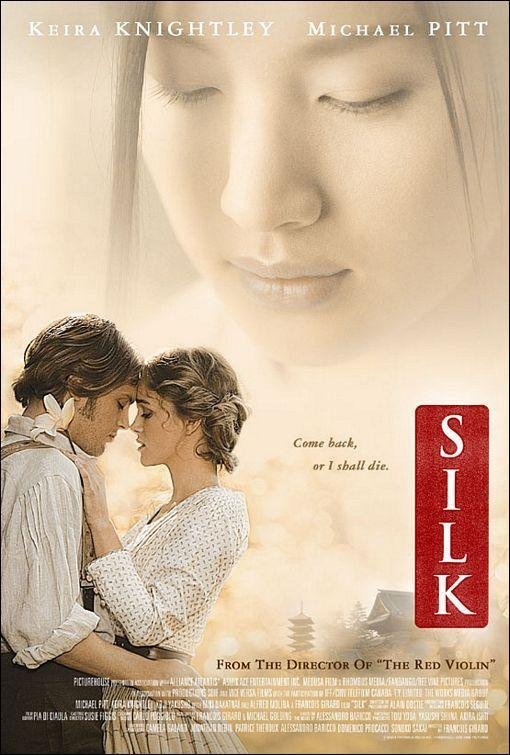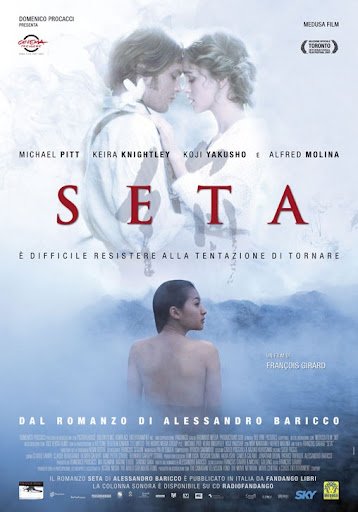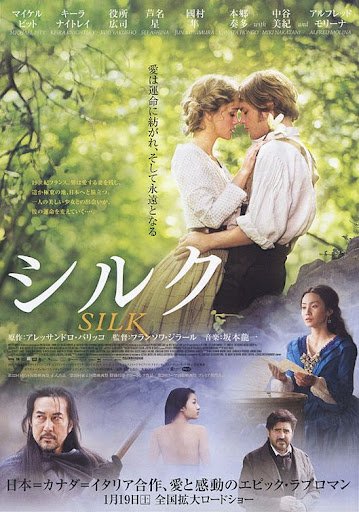
Basada en la novela de Alessandro Baricco
Normally I don't mind watching the film adaptation of a novel because I can separate one thing from the other and the stories - although they lose some things in the process - gain scenes and moments that didn't exist in the original book, but sometimes, as with Milan Kundera's The unbearable lightness of being, we miss what the novel has that is non-transferable, untranslatable to the screen, such as certain analyses, the language and the voice of the narrator/author.
Normalmente no me molesta ver la adaptación cinematográfica de una novela porque puedo separar una cosa de la otra y las historias - aunque pierden algunas cosas en el proceso - ganan escenas y momentos que en el libro original no existían, pero a veces, como con La insoportable levedad del ser de Milan Kundera, se echa en falta aquello que tiene la novela de intransferible, de intraducible a la pantalla, como ciertos análisis, el lenguaje y la voz del narrador/autor.
For that same reason I had not wanted to see Silk, based on the novel by the Italian writer Alessandro Baricco, but as with Kundera's book, in order to participate in a reading club and comment on things about the book and the movie, I finally agreed and saw this adaptation, directed by the Canadian François Girard, co-written by him with Michael Golding and starring Michael Pitt, Keira Knightley, Kôji Yakusho and Alfred Molina. Silk is set in 19th century France in which Hervé Joncour (Michael Pitt), a former soldier turned merchant, travels beyond the borders of his country to acquire eggs of silkworms, raw material for the spinning mills of his town that produce silk, a commercial activity that sustains life there an Lavilledieu. At first, Hervé goes to Egypt to look for the worms, but after an epidemic that affects the eggs breaks out, the town's merchants decide to send him to a remote land where the finest and most beautiful silk that anyone has ever seen is produced, a land as distant as it is mysterious and full of dangers, a country called Japan. The journey is now longer and more difficult, but in the land of the rising sun Hervé will encounter a mystery that will consume him to the point of forcing him to return - and not just once - with the intention of knowing who is that mysterious woman with slanted eyes that caught him since his first visit.
Por esa misma razón no había querido ver Seda, basada en la novela del escritor italiano Alessandro Baricco, pero al igual que con el libro de Kundera, con motivo de participar en un club de lectura y de comentar cosas del libro y de la película, finalmente accedí y vi esta adaptación, dirigida por el canadiense François Girard, co escrita por él junto a Michael Golding y protagonizada por Michael Pitt, Keira Knightley, Kôji Yakusho y Alfred Molina. Silk (Seda) se sitúa en la Francia del siglo XIX en la que Hervé Joncour (Michael Pitt), un ex soldado reconvertido en mercader, se dedica a viajar más allá de las fronteras de su país para adquirir huevos de gusanos de seda, materia prima para las hilanderías de su villa que producen seda, actividad comercial que sostiene la vida allí an Lavilledieu. Al principio, Hervé va a Egipto a buscar los gusanos, pero luego de que estalla una epidemia que afecta los huevos, los comerciantes del pueblo deciden enviarlo a una remota tierra en la que se produce la seda más fina y hermosa que hubiera visto persona alguna, una tierra tan lejana como misteriosa y llena de peligros, un país llamado Japón. El viaje es ahora más largo y difícil, pero en la tierra del sol naciente Hervé se topará con un misterio que lo consumirá al punto de obligarlo a volver - y no sólo una vez - con la intención de saber quién es esa misteriosa mujer de ojos sesgados que lo miró a atrapó desde su primera visita.
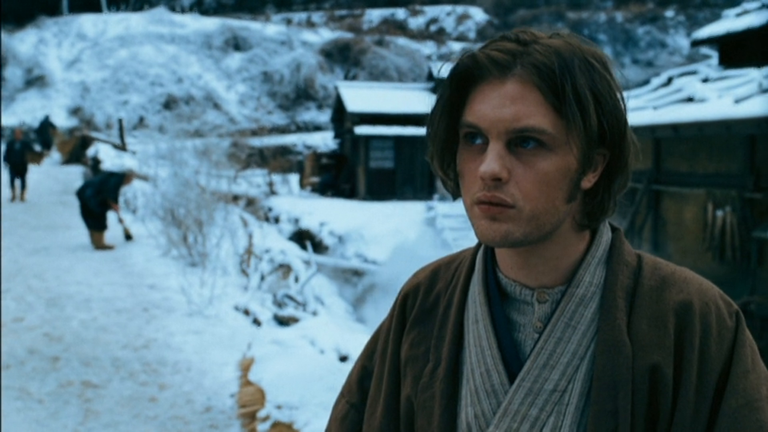
Now, although he's young, Hervé is married to Helene (Keira Knightley) with whom he seems to lead a happy life and who is dedicated to teaching classes and building his dream garden in the front yard of the house they both live in. Although he had traveled before, after Hervé's first return from Japan, Helene notices that something has changed in her husband and although she senses it, it hurts her that Hervé doesn't tell her.
Ahora bien, aunque es joven, Hervé está casado con Helene (Keira Knightley) con quien parece llevar una vida feliz y quien se dedica a dar clases y a construir su jardín soñado en el patio frontal de la casa que ambos habitan. Aunque ya había viajado antes, luego del primer regreso de Hervé desde Japón, Helene nota que algo ha cambiado en su esposo y aunque lo intuye, le duele que Hervé no se lo cuente.
We are then to blame for an incipient infidelity and the exoticism of a distant land at a time when that same land was a complete mystery. Added to this are interesting secondary characters, such as Baldabiou (Alfred Molina), the person responsible for making silk in the town; Madame Blanche (Miki Nakatani), a famous prostitute; Hara Jubei (Kōji Yakusho), the leader of the Japanese village where Hervé buys the silkworms and of course the mysterious and unnamed woman with whom the protagonist becomes obsessed (played by Sei Ashina). With the interactions between all these characters, a story of adventure, romance, and eroticism is woven, but also full of danger and betrayal. If you haven't read the book, the movie is pretty good. A little more somber, perhaps, as a result of the absence of Baricco's cheerful prose, but I think it's an enjoyable story. However, it's a different story from the book, not because scenes have been omitted but because some plot cores were moved and some essential details in the novel were modified on the screen, enriching some characters to the detriment of others. For example, in the film version Helene has a stronger personality, greater character and greater prominence, to the point of undertaking a project - the garden - that in the novel corresponded to Hervé for a very different reason.
Tenemos entonces la culpa de una incipiente infidelidad y el exotismo de una tierra lejana en una época en la que esa misma tierra era todo un misterio. A ello se suman personajes secundarios interesantes, como Baldabiou (Alfred Molina), el responsable de que en la villa se fabrique la seda; Madame Blanche (Miki Nakatani), una famosa meretriz; Hara Jubei (Kōji Yakusho), el líder de la aldea japonesa en donde Hervé compra los gusanos de seda y por supuesto la misteriosa e innominada mujer con quien se obsesiona el protagonista (interpretada por Sei Ashina). Con las interacciones entre todos estos personajes se va tejiendo una historia de aventuras, romance, erotismo, pero también llena de peligros y traiciones. Si no se ha leído el libro, la película está bastante bien. Algo más sombría, tal vez, como consecuencia de la ausencia de la prosa alegre de Baricco, pero creo que es una historia disfrutable. Sin embargo, es una historia diferente a la del libro, no porque se hayan omitido escenas sino porque algunos núcleos de la trama se movieron de lugar y algunos detalles esenciales en la novela fueron modificados en la pantalla enriqueciendo algunos personajes en detrimento de otros. Por ejemplo, en la versión filmica Helene tiene una personalidad más fuerte, mayor carácter y mayor protagonismo, al punto de emprender un proyecto - el jardín - que en la novela correspondía a Hervé por razones muy diferentes.
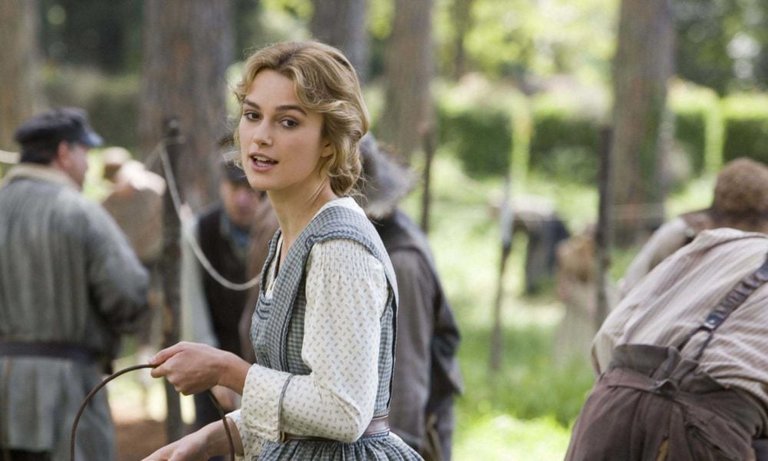
If they are judged like this, as two different things, the book and the movie, the latter ends up benefiting, but one thing that I don't understand and that I don't agree with is that the origin of the mysterious woman has been changed. The book emphasizes that she did not have slanted eyes in addition to other details that identify her as someone exotic in Japan, which helped magnify the mystery: who is she? where did she come from? how did she get there?
Si se juzgan así, como dos cosas diferentes, el libro y la película, se acaba beneficiando a esta última, pero una cosa que no entiendo y con la que no estoy de acuerdo es con que se haya cambiado el origen de la mujer misteriosa. En el libro se hace énfasis en que no tenía los ojos rasgados además de otros detalles que la identifican como alguien exótica en Japón, lo que ayudaba a magnificar el misterio: ¿quién es? ¿de dónde viene? ¿cómo llegó allí?
But in the movie that exoticism becomes something more local since the girl is of Chinese origin. And although she's not Japanese and one could ask the same questions mentioned above, the impact is not the same. Having done the sums and subtractions, once again it's demonstrated that the book is superior to the film and by far in this case because Baricco's language, the melody of his sentences, his humor, his creativity and the way of insinuating things for the reader to deduce them and complete the story generates a greater connection than the scenes on the screen. However, it must be said in favor of Silk that it has a good cast, actors and actresses who do very well in their respective roles thanks to their experience. Michael Pitt is Dr. Ian Gray from I Origin, Kôji Yakusho is the charismatic Hirayama from Perfect Days, Alfred Molina is Dr. Octopus from Spider-Man (among many other roles) and nothing to say about the talented Keira Knightley who a once again works here in a period production (Pride and Prejudice, Anna Karenina, The Duchess). Even though Baricco is one of my favorite authors and I consider Seda one of the best novels ever written, I don't regret having seen the film despite its flaws because it felt like another story and the experience does not harm my assessment of the book that already had deep roots within me, have any of you read Baricco's book? Have you seen the movie? I read you in the comments.
Pero en la película ese exotismo se vuelve algo más local ya que la chica es de origen chino. Y aunque no es japonesa y uno podría hacerse las mismas preguntas antes mencionadas, el impacto no es el mismo. Hechas las sumas y las restas, una vez más queda demostrado que el libro es superior a la película y por mucho en este caso porque el lenguaje de Baricco, la melodía de sus frases, su humor, su creatividad y la manera de insinuar cosas para que el lector las deduzca y complete la historia generan una conexión mayor que las escenas en la pantalla. Sin embargo, hay que decir a favor de Silk que tiene un buen elenco, actores y actrices que lo hacen muy bien en sus respectivos papeles gracias a su experiencia. Michael Pitt es el Dr. Ian Gray de I Origin, Kôji Yakusho es el carismático Hirayama de Perfect Days, Alfred Molina es el Dr. Octopus de Spider-Man (entre muchos otros papeles) y nada que decir de la talentosa Keira Knightley que una vez más trabaja aquí en una producción de época (Pride and Prejudice, Ana Karenina, The Duchess). A pesar de que Baricco es uno de mis autores favoritos y considero a Seda una de las mejores novelas jamás escritas, no me arrepiento de haber visto la película a pesar de sus defectos porque la sentí como otra historia y la experiencia no perjudica mi valoración del libro que ya tenía muy arraigado dentro de mí, ¿alguno de ustedes ha leído el libro de Baricco? ¿han visto la película? Los leo en los comentarios.

